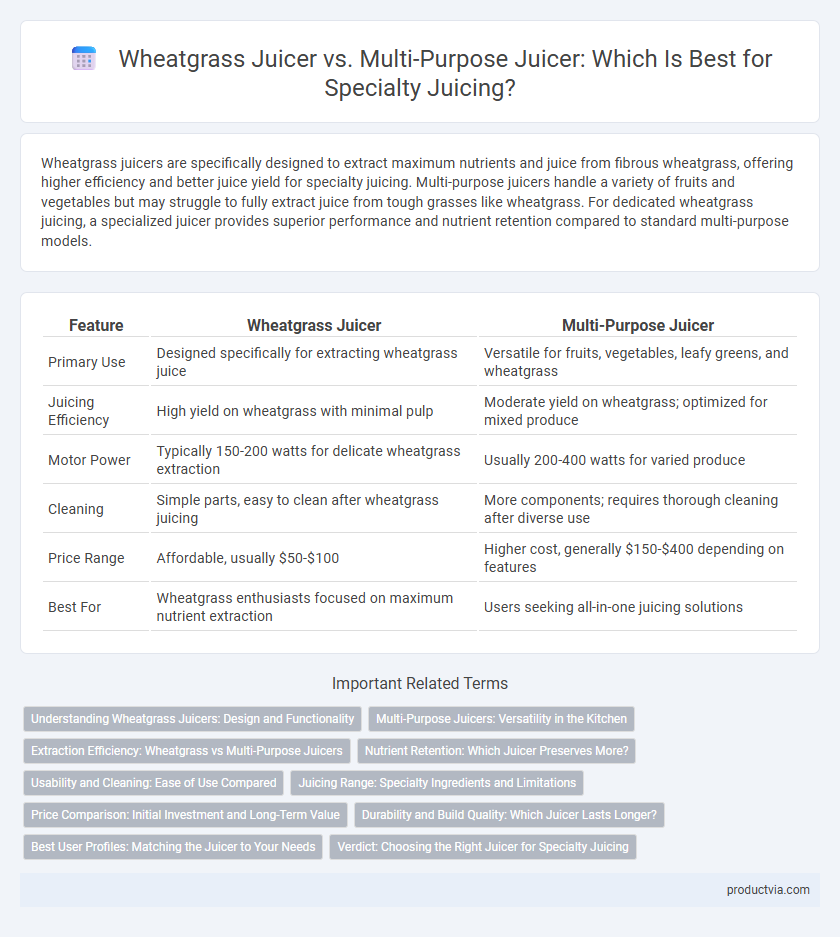Wheatgrass juicers are specifically designed to extract maximum nutrients and juice from fibrous wheatgrass, offering higher efficiency and better juice yield for specialty juicing. Multi-purpose juicers handle a variety of fruits and vegetables but may struggle to fully extract juice from tough grasses like wheatgrass. For dedicated wheatgrass juicing, a specialized juicer provides superior performance and nutrient retention compared to standard multi-purpose models.
Table of Comparison
| Feature | Wheatgrass Juicer | Multi-Purpose Juicer |
|---|---|---|
| Primary Use | Designed specifically for extracting wheatgrass juice | Versatile for fruits, vegetables, leafy greens, and wheatgrass |
| Juicing Efficiency | High yield on wheatgrass with minimal pulp | Moderate yield on wheatgrass; optimized for mixed produce |
| Motor Power | Typically 150-200 watts for delicate wheatgrass extraction | Usually 200-400 watts for varied produce |
| Cleaning | Simple parts, easy to clean after wheatgrass juicing | More components; requires thorough cleaning after diverse use |
| Price Range | Affordable, usually $50-$100 | Higher cost, generally $150-$400 depending on features |
| Best For | Wheatgrass enthusiasts focused on maximum nutrient extraction | Users seeking all-in-one juicing solutions |
Understanding Wheatgrass Juicers: Design and Functionality
Wheatgrass juicers are specifically designed to extract juice from fibrous wheatgrass using a slow, masticating mechanism that preserves nutrients and maximizes juice yield. Their specialized auger and micro-mesh strainer optimize the delicate extraction process, preventing oxidation and maintaining the vibrant green color and rich enzymatic content of wheatgrass juice. Unlike multi-purpose juicers, which prioritize versatility for fruits and vegetables, wheatgrass juicers excel in producing high-quality, nutrient-dense wheatgrass juice with minimal pulp and maximum efficiency.
Multi-Purpose Juicers: Versatility in the Kitchen
Multi-purpose juicers excel in versatility, allowing users to process fruits, vegetables, nuts, and leafy greens like wheatgrass with a single appliance. Their powerful motors and adjustable settings accommodate various textures and juicing techniques, making them ideal for specialty juicing beyond just wheatgrass. This adaptability reduces the need for multiple devices, streamlining kitchen operations and enhancing overall juicing efficiency.
Extraction Efficiency: Wheatgrass vs Multi-Purpose Juicers
Wheatgrass juicers feature a slow, cold-press masticating mechanism specifically designed to maximize extraction efficiency from fibrous wheatgrass, yielding higher nutrient retention and juice volume. Multi-purpose juicers, often centrifugal, provide faster processing but typically result in lower extraction efficiency and increased oxidation when juicing wheatgrass due to their high-speed blades. For specialty juicing of wheatgrass, masticating juicers outperform multi-purpose models by delivering richer, more concentrated juice with minimal nutrient loss.
Nutrient Retention: Which Juicer Preserves More?
Wheatgrass juicers are specifically designed to extract maximum nutrients by gently crushing and pressing wheatgrass fibers, preserving vital enzymes and chlorophyll for superior nutrient retention. In contrast, multi-purpose juicers, while versatile, often use high-speed or centrifugal mechanisms that generate heat and oxidation, leading to nutrient degradation. For specialty juicing focused on nutrient preservation, a wheatgrass juicer typically outperforms multi-purpose models by maintaining higher levels of vitamins, minerals, and antioxidants.
Usability and Cleaning: Ease of Use Compared
Wheatgrass juicers are specifically designed for extracting juice from fibrous wheatgrass with minimal pulp, making them highly efficient and easy to operate for this specialty task. Multi-purpose juicers handle a wider range of fruits and vegetables but often require more extensive cleaning due to larger pulp compartments and mixed residue. For usability and cleaning, wheatgrass juicers offer straightforward operation and quick cleanup, while multi-purpose juicers demand more time and effort to maintain optimal performance.
Juicing Range: Specialty Ingredients and Limitations
Wheatgrass juicers are specifically designed to extract maximum nutrients from tough, fibrous greens like wheatgrass and leafy herbs, ensuring high juice yield and minimal pulp. Multi-purpose juicers offer a broader juicing range, handling fruits, vegetables, nuts, and even leafy greens, but they may struggle with dense, fibrous ingredients like wheatgrass, resulting in lower extraction efficiency. While wheatgrass juicers excel in specialty juicing for nutrient-dense greens, their functionality is limited compared to multi-purpose models that accommodate diverse ingredients but compromise on expertise with specific superfoods.
Price Comparison: Initial Investment and Long-Term Value
Wheatgrass juicers are specialized machines designed to efficiently extract juice from fibrous grasses, often priced between $100 and $300, offering high efficiency for wheatgrass but limited versatility. Multi-purpose juicers typically range from $150 to $500, providing broader functionality for fruits and vegetables but potentially less optimized performance for wheatgrass extraction. Considering long-term value, wheatgrass juicers deliver better yield and durability for focused wheatgrass juicing, while multi-purpose juicers offer greater flexibility for varied juicing needs, impacting overall cost-effectiveness based on usage frequency.
Durability and Build Quality: Which Juicer Lasts Longer?
Wheatgrass juicers are specifically engineered with heavy-duty stainless steel components to withstand the tough fibrous nature of wheatgrass, providing superior durability and longer lifespan compared to multi-purpose juicers. Multi-purpose juicers often incorporate plastic parts and complex mechanisms that may wear out faster under frequent wheatgrass use, resulting in reduced longevity. Investing in a dedicated wheatgrass juicer ensures enhanced build quality and sustained performance for specialty juicing needs.
Best User Profiles: Matching the Juicer to Your Needs
Wheatgrass juicers excel in extracting maximum nutrients from fibrous wheatgrass, making them ideal for health enthusiasts focused on green superfoods and daily detox routines. Multi-purpose juicers offer versatility by handling a variety of fruits, vegetables, and leafy greens, suiting users who seek diverse juice options and occasional wheatgrass use. Choosing between these juicers depends on prioritizing nutrient extraction efficiency for wheatgrass versus the flexibility of juicing multiple produce types.
Verdict: Choosing the Right Juicer for Specialty Juicing
Wheatgrass juicers excel in extracting nutrient-dense juice from fibrous wheatgrass, delivering maximum chlorophyll and enzyme retention, whereas multi-purpose juicers offer versatility for fruits, vegetables, and leafy greens but may produce less concentrated wheatgrass juice. For specialty juicing focused on wheatgrass, a dedicated wheatgrass juicer with slow, masticating extraction technology ensures higher yield and superior nutrient preservation. Selecting the right juicer depends on prioritizing wheatgrass juice quality over broad functionality, making specialized juicers the optimal choice for health-conscious users targeting wheatgrass benefits.
Wheatgrass juicer vs Multi-purpose juicer for specialty juicing Infographic

 productvia.com
productvia.com